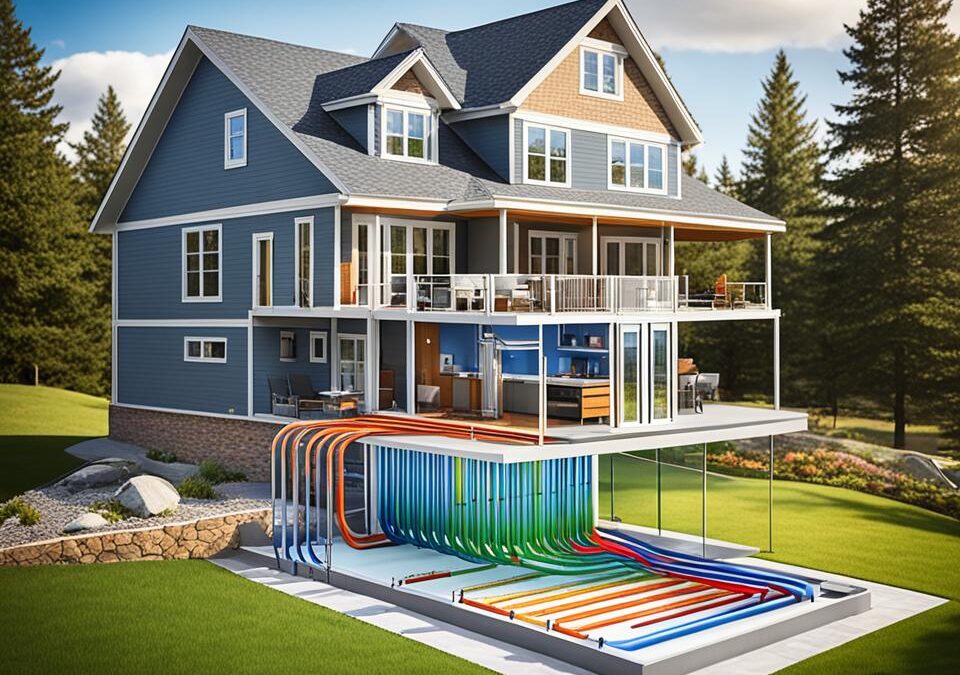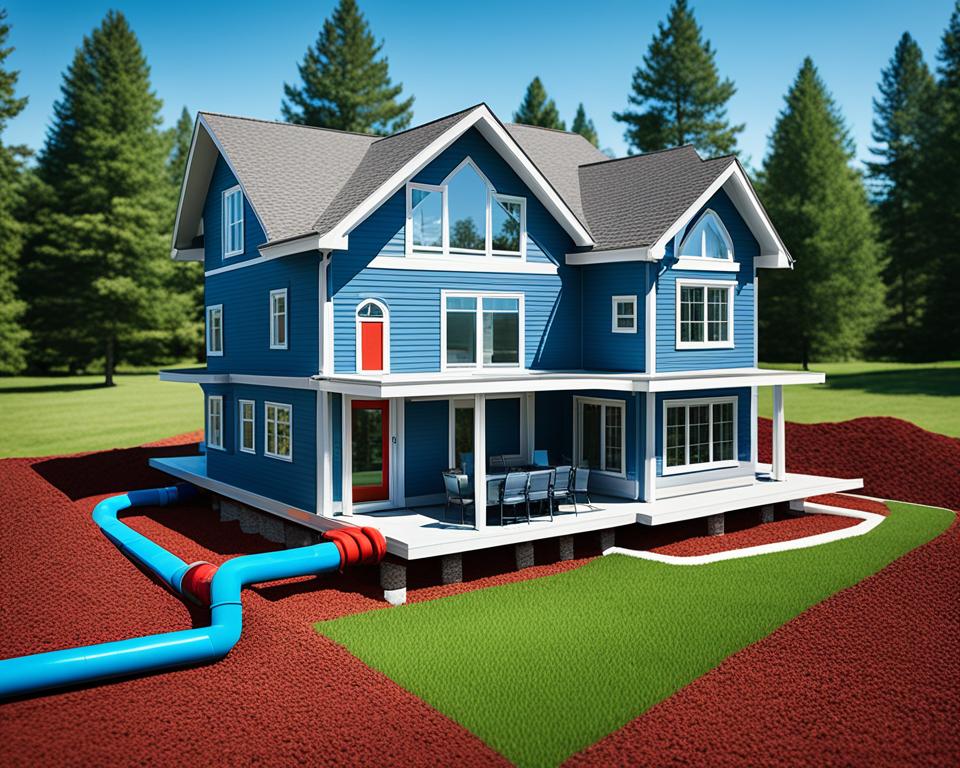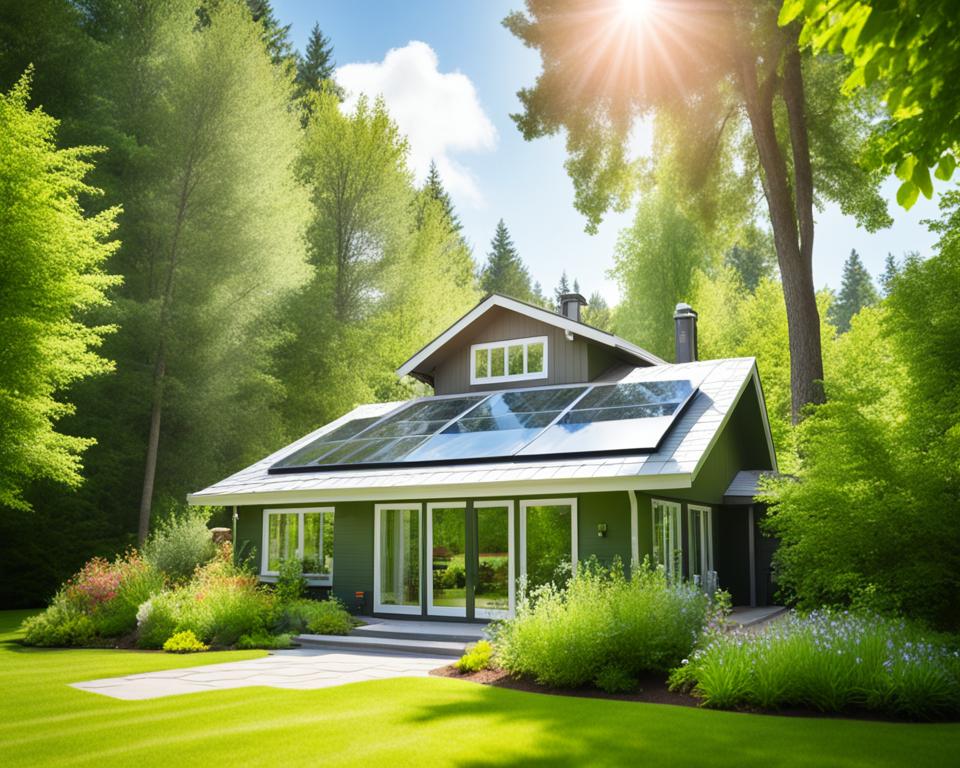In our quest for sustainable home comfort, we’re constantly on the lookout for the next breakthrough. Traditional heating and cooling solutions have long been the norm, yet they often fall short in delivering the eco-conscious efficiency we yearn for. Enter geothermal HVAC, a technology that promises a revolution in how we maintain our homes’ sanctuaries.
This renewable energy system isn’t just another alternative; it’s a game-changer in energy-efficient heating and cooling, harnessing the earth’s remarkably stable subterranean temperatures to optimize our living spaces.
Join us as we delve into the heart of this groundbreaking approach to environmental and economic well-being. We’re not just talking about technology; we’re talking about a lifestyle shift. Embracing geothermal HVAC systems is more than a choice—it represents a commitment to advancing the future of eco-friendly living.
In this exploration, you will discover how these sophisticated systems redefine the concept of comfort, magnifying both the energy we save and the sustainability we gain.
Tabe of Contents
- Understanding Geothermal Heating and Cooling Systems
- The Science Behind Geothermal HVAC Efficiency
- Comparing Geothermal Heat Pumps with Traditional HVAC Systems
- Installation and Types of Geothermal Heat Pumps
- Evaluation of Geothermal HVAC Cost-Effectiveness
- Debunking Myths Surrounding Geothermal Technology
- People Also Ask
- What exactly is a geothermal HVAC system?
- How do geothermal heating and cooling systems work?
- Why are geothermal HVAC systems considered highly efficient?
- How does a geothermal system compare to a traditional HVAC system?
- What are the different types of geothermal heat pump installations?
- Is investing in a geothermal HVAC system cost-effective?
- Are there common misconceptions about geothermal HVAC systems?
- Why should I choose geothermal technology for my home or business?
- Conclusion
Key Takeaways
- Geothermal HVAC is an innovative solution for sustainable home comfort.
- Leveraging the earth’s stable temperatures contributes to energy-efficient heating and cooling.
- As a renewable energy system, geothermal reduces greenhouse emissions and energy consumption.
- These systems are at the forefront of home energy solutions, combining eco-friendliness with cutting-edge functionality.
- Adopting geothermal technology is a stride towards a sustainable, cost-effective future.
Understanding Geothermal Heating and Cooling Systems
As we delve into the intricacies of geothermal heating and cooling, it is imperative to shed light on why this energy-efficient HVAC upgrade is becoming increasingly indispensable in modern homes.
At the core of a geothermal energy system is the earth’s natural propensity to store heat energy, a property that geothermal technology adeptly harnesses to regulate indoor temperature.
The operational genius behind these systems lies in the heat pump’s ability to tap into the earth’s consistent underground temperature to either warm or cool a living space. In this exchange, a fluid mixture – commonly water or an antifreeze solution – circulates through loops buried in the ground to either absorb or dissipate heat, depending on the season.
| Season | Action | Result |
|---|---|---|
| Winter | Extracts heat from ground | Provides heating |
| Summer | Disperses heat into ground | Provides cooling |
| All Year | Maintains efficiency | Reduces energy usage |
Unlike conventional units that burn fossil fuels or rely on fluctuating ambient air temperatures, geothermal systems provide a more stable and sustainable approach to climate control. This sophisticated interaction with the ground’s thermal stability exemplifies the advanced engineering that propels geothermal heating and cooling to the forefront of eco-friendly solutions.
In essence, embracing geothermal technology not only bolsters the push towards renewable energy but also elevates household comfort to unprecedented levels of consistency and reliability.
For those contemplating an energy-efficient HVAC upgrade, understanding these mechanisms is the first step towards making an informed decision that benefits both the environment and your living space.
The Science Behind Geothermal HVAC Efficiency
At the heart of the geothermal heat pump lies a simple yet profound concept: consistent underground temperatures that offer a renewable energy source for advanced heat exchange.
Tapping into this subterranean treasure can revolutionize how we maintain comfort in our homes, promising significant electricity savings and positioning these systems as a high-efficiency alternative to traditional HVAC solutions. Let’s delve into the technical brilliance that powers the geothermal advantage.
Steady Underground Temperatures as Energy Source
The key to a geothermal heat pump’s success is the earth’s ability to absorb and store nearly half of the solar energy it receives; this energy is what keeps the ground below the frost line at a stable temperature year-round.
By harnessing this constant temperature, geothermal systems efficiently provide heating and cooling regardless of the weather overhead.
Advanced Heat Exchange Mechanisms
Geothermal systems employ state-of-the-art heat exchange methods to maximize energy transfer. A network of underground pipes, or loops, circulate a fluid that absorbs or relinquishes heat as needed.
This results in an efficient transport of thermal energy, minimizing the loss that typically occurs in conventional heating and cooling processes.
Electricity Usage in Geothermal Solutions
Relative to traditional HVAC systems, geothermal heat pumps operate on a fraction of the electricity, offering homeowners considerable savings on energy bills.
While traditional systems are often inefficient and wasteful, geothermal solutions leverage their advanced mechanisms to enhance performance and reduce unnecessary energy expenditure.
Comparing Geothermal Heat Pumps with Traditional HVAC Systems
As we explore the benefits of a geothermal cooling system over a traditional air conditioner and fossil fuel furnace, the sheer scale of energy consumption reduction becomes abundantly clear.
Geothermal heat pumps, with their ability to efficiently utilize underground temperatures for home comfort, stand in stark contrast to the operation of conventional systems.
Consider the fact that a geothermal heat pump consumes significantly less electricity for the same amount of heating or cooling. This not only leads to a reduced home energy profile but also means less reliance on electricity grids, often burdened with high demands particularly during peak seasons.
Geothermal systems epitomize energy conversion efficiency by using one unit of electricity to move up to five units of heating or cooling, a performance unattainable by traditional HVAC systems.
Furthermore, the operational lifespan of indoor components in a geothermal setup is also superior. While traditional air conditioners and furnaces may require replacement every 10 to 15 years, geothermal technology continues to perform for up to 25 years or more.
This represents a significant return on investment for homeowners seeking sustainable, long-term solutions for their comfort needs.
| Feature | Geothermal Heat Pump | Traditional HVAC System |
|---|---|---|
| Efficiency in Energy Conversion | Can transfer up to five units of energy per one unit of electricity. | Less efficient with more electricity needed for equal heat or cool transfer. |
| Operational Lifespan | Up to 25 years for indoor components. | Averages 10-15 years before requiring replacement. |
| Emissions | 44% fewer emissions than air-source heat pumps. | Higher associated emissions, with a significant carbon footprint. |
| Annual Energy Consumption | Significantly lower, with substantial energy cost savings. | Higher energy consumption leading to increased utility bills. |
In conclusion, as we weigh the merits between geothermal units and traditional systems, it’s clear that the future tilts towards the adoption of geothermal technologies. Not only do they promise and deliver on energy consumption reduction, but their contribution to a more sustainable planet cannot be overstated.
Installation and Types of Geothermal Heat Pumps
At the heart of an eco-friendly home heating system is the geothermal HVAC installation, a solution we advocate for its minimal environmental impact and substantive energy efficiency.
Whether you’re considering a new construction or retrofitting an existing property, selecting the right type of geothermal heat pump is essential for optimal performance and sustainability. Let’s explore the various systems available and how they integrate into different landscapes.
Horizontal Closed-Loop Systems
Horizontal closed-loop systems are particularly adaptable for residential spaces with adequate land. These involve excavating trenches to house the pipework that will circulate an antifreeze solution. A typical horizontal loop system lies at a depth where the soil temperature is consistent, using the earth’s energy to heat or cool your home effectively.
Vertical Closed-Loop Systems
When space is at a premium or the landscape is less accommodating, a vertical closed-loop system offers a fitting alternative. Here, drilling occurs to install vertical pipes that extend several hundred feet into the ground. Such installations are common in urban settings or where surface area is constrained, providing the same heating and cooling efficacy in a compact space.
Pond or Lake Closed-Loop Systems
If your property is near a significant water source, a pond or lake closed-loop system could be an innovation worth considering. By placing pipes below the surface of the water, your system uses the natural thermal properties of the pond or lake to regulate your home’s temperature.
Open-Loop Systems and Environmental Considerations
Open-loop systems, while less common, utilize readily available groundwater as a direct energy exchange medium. These systems require a plentiful and sustainable water source and are designed with environmental safety as a priority, ensuring that water is returned to its original aquifer with minimal impact on the ecosystem.
To elucidate further, let’s compare these systems based on key characteristics to help you determine which type may be best suited to your property’s needs.
| System Type | Land Requirement | Installation Depth | Footprint Impact | Best Suited For |
|---|---|---|---|---|
| Horizontal Closed-Loop | Substantial | 4-6 feet | Moderate | Residential areas with ample yard space |
| Vertical Closed-Loop | Minimal | 100-400 feet | Minimal | Urban homes, small lots |
| Pond/Lake Closed-Loop | Access to a body of water | Varies with water depth | Minimal to None | Properties adjacent to water |
| Open-Loop | Access to an abundant water source | N/A | Minimal | Areas with high water table and environmental clearance |
We consider geothermal HVAC installation not just an upgrade to your home but an investment in a sustainable future.
By choosing the appropriate system—be it a horizontal closed-loop system for expansive yards, a vertical closed-loop system for tighter spaces, or utilizing nearby water bodies with a pond or lake system—you lay the groundwork for eco-friendly home heating that serves you efficiently for years to come.
Evaluation of Geothermal HVAC Cost-Effectiveness
When we delve into the realm of sustainable energy, it’s crucial to compare the initial investment against the long-term financial benefits. In the case of geothermal HVAC systems, the upfront costs may initially appear steep, yet the enduring rewards paint a different picture of overall cost-effectiveness.
The substantial energy bill reduction and generous tax credits coupled with the impressive geothermal system lifespan make it a savvy choice for environmentally conscious homeowners.
Upfront Installation Costs and Long-Term Savings
The upfront cost of installing a geothermal HVAC system can be notably higher compared to traditional options. However, the geothermal HVAC benefits quickly become apparent as homeowners enjoy a dramatic reduction in energy bills.
With potential energy bill slashing of 40 to 60 percent, the investment is often recouped within a mere 5 to 10 years, establishing geothermal technology as a champion of both energy conservation and financial savvy.
Tax Credits and Incentives for Geothermal Systems
A significant allure of geothermal HVAC systems lies in the financial incentives available. A 30 percent tax credit for eligible geothermal installations ignites interest and eases the initial burden of investment.
This enticing tax credit is an opportunity we can capitalize on, enhancing the attractiveness of geothermal solutions and propelling their adoption in our quest for green living.
Lifespan and Durability of Geothermal Components
The rigorous construction and resilience of geothermal components, particularly the underground loops that promise decades of service, highlight the geothermal system’s durability.
This translates to a geothermal system lifespan extending up to 25 years for indoor equipment – remarkably longer than traditional HVAC systems. Durability and longevity underscore geothermal HVAC as a sustainable and robust home investment.
Debunking Myths Surrounding Geothermal Technology
We often encounter several misconceptions about geothermal HVAC systems. It’s our mission to correct these myths and shed light on the true capabilities of this innovative technology. Let’s set the record straight and establish the factual advantages of geothermal energy for sustainable heating and cooling.
One widespread geothermal HVAC myth is the believed need for vast tracts of land. However, with the adoption of vertical loop systems, this simply isn’t the case. These systems require only a modest amount of space, making them perfectly adaptable to urban environments or smaller residential properties.
Another point of confusion lies in the supposed noise levels produced by geothermal units. In contrast to the noisy compressors and fans of traditional HVAC systems, geothermal heat pumps operate with a quiet operation. This hidden underground equipment provides a peaceful, virtually silent function while maintaining comfort inside your home or office.
Many consumers also mistakenly believe geothermal technology to be solely a heating solution. Yet, geothermal heat pumps boast incredible versatility, adeptly providing both warming and cooling solutions, hence challenging the ambient conditions during all seasons.
Fears concerning water usage with geothermal systems can also be quelled. The closed-loop systems utilize an antifreeze solution, recycled continuously within, and open-loop setups responsibly return water back to the source, thereby negating the exorbitant water waste linked with traditional cooling towers.
- Vertical Loop Efficiency: Minimal space with maximum output
- Quiet Comfort: Enjoy the silence without compromising on temperature control
- Year-Round Versatility: Equally efficient in both heating and cooling
- Water Conservation: Sustainable water usage through advanced recycling processes
By highlighting the sustainable heating solution that geothermal technology presents, we hope to encourage a greater understanding and adoption of this eco-friendly advancement. It is indeed a smart choice for the forward-thinking consumer.
In conclusion, we invite readers to look beyond the myths and consider the broad scope of benefits that geothermal heat pumps can offer. From their quiet operation to their ecological advantages, geothermal systems stand as an exceptional choice for those seeking a sustainable and versatile solution for their homes.
People Also Ask
What exactly is a geothermal HVAC system?
A geothermal HVAC system is a type of sustainable home comfort technology that uses the earth’s stable underground temperature to provide energy-efficient heating and cooling. It leverages a geothermal heat pump to transfer heat to or from the ground, offering a renewable energy system alternative for climate control in residential and commercial buildings.
How do geothermal heating and cooling systems work?
Geothermal heating and cooling systems operate by using a geothermal heat pump connected to a series of underground pipes. These pipes circulate a liquid that absorbs or disperses heat from/to the ground, providing temperature regulation for your home. This geothermal technology is an energy-efficient HVAC upgrade from traditional methods.
Why are geothermal HVAC systems considered highly efficient?
Geothermal HVAC systems are highly efficient due to the use of steady underground temperatures as an energy source, which are more constant than air temperatures. The advanced heat exchange mechanisms within the system make the process of heating and cooling more efficient than conventional air conditioners and furnaces. Additionally, geothermal solutions typically use less electricity, contributing to savings on energy costs.
How does a geothermal system compare to a traditional HVAC system?
Compared to traditional HVAC systems, geothermal systems have a lower environmental impact, reduced energy consumption, and tend to have fewer emissions. Additionally, geothermal cooling systems do not rely on outside air and are thus not affected by fluctuating weather conditions, which helps in maintaining a consistent efficiency rate throughout the year.
What are the different types of geothermal heat pump installations?
There are several types of geothermal heat pump installations, including horizontal closed-loop systems, which are used where space allows; vertical closed-loop systems for smaller properties; pond or lake closed-loop systems that take advantage of natural bodies of water; and open-loop systems that are suitable for areas with abundant water resources.
Each type has been designed to minimize environmental impact while optimizing energy efficiency.
Is investing in a geothermal HVAC system cost-effective?
Yes, investing in a geothermal HVAC system can be cost-effective. Although the initial installation costs may be higher compared to traditional systems, the long-term energy and maintenance savings, combined with possible tax credits and incentives, often lead to significant cost recovery. The durability and longevity of geothermal system components further enhance the investment’s value.
Are there common misconceptions about geothermal HVAC systems?
Indeed, there are some common misconceptions about geothermal HVAC systems. They are often thought to require a lot of land, which isn’t true due to vertical loop options. They’re presumed to be noisy, but they operate quietly given that most equipment is underground.
There’s also a misconception that they only provide heating when in fact they offer efficient cooling as well. Lastly, concerns about water usage are misinformed because closed-loop systems recirculate their solution, and open-loop systems typically return water back to its source, thus conserving water.
Why should I choose geothermal technology for my home or business?
Opting for geothermal technology is a sustainable choice for both residential and commercial properties, as it significantly reduces carbon emissions and provides a clean, renewable source of energy. It also represents a long-term savings opportunity due to reduced utility bills and maintenance costs.
Furthermore, modern advancements in geothermal HVAC design have made it a versatile and reliable option for achieving optimal comfort and advancing eco-friendly living.
Conclusion
As we navigate toward a more eco-conscious future, the role of geothermal HVAC systems in our homes and businesses becomes increasingly significant. Integrating sustainability into our daily lives, these sophisticated heating and cooling solutions stand at the forefront of green innovation.
They are not just a leap in technology; they are a stalwart commitment to the environment coupled with a smart financial strategy for energy management in the long run. By investing in a geothermal HVAC system, we make a solid, sustainable choice for our planet while enabling cost-effective home comfort.
In the stride towards better environmental stewardship, a geothermal HVAC investment translates to tapping into the earth’s renewable energy for long-term benefits. Its low operating costs, coupled with reduced carbon emissions, articulate a sustainable home solution that aligns with the burgeoning demand for green living. Embracing this technology not only mitigates the ecological impact of our heating and cooling needs but also fosters substantial energy savings for years to come.
When considering the transition to these eco-friendly systems, pinpointing reliable AC contractors is crucial. Air Conditioners Contractors offers proficiency not found elsewhere, specializing in expert AC installations and meticulous service. We stand dedicated to ensuring your home’s comfort at every level, with a team well-versed in the intricacies of geothermal solutions. Banking on our expertise guarantees precision, reliability, and peace of mind as you step into the age of renewable energy with geothermal HVAC—all while optimizing your climate control investment.

Bobby leads Air Conditioners Contractors with a vision for innovation and excellence in the HVAC industry. With a passion for customer satisfaction and a drive for technological advancement, he ensures the company remains at the forefront of delivering top-tier air conditioning solutions across the USA. His leadership fosters a culture of dedication, expertise, and commitment to exceeding client expectations.



